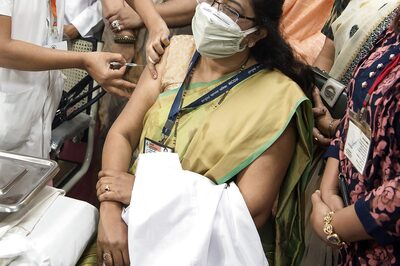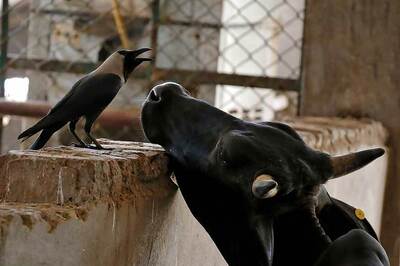
views
On 15 January 2004, the journalists had expected a sentimental flower-laden journey across the train's inaugural run across the border. Instead we found ourselves on a grueling trip aboard an inconvenient train, with customs officers and policemen harassing passengers at every turn. The mood on board was anything but syrupy and sentimental. Instead it was robustly impatient about the whims of politicians.
The Samjhauta Express or the Atttari Express leaves the Old Delhi railway station at 10pm. It then travels to Attari. It is at Attari that the Attari Express changes formally into the Samjhauta Express. Three years ago this train too like the Indian one that comes to Attari was decorated with flowers, balloons and buntings. Ceremonially dressed BSF horsemen escorted the train to the border, from where it chugged to Wagah and then on to Lahore. For most passengers bound for other cities, the Samjhauta Express is only the first leg of long journeys. Disembarking at Lahore, they then have to take connecting trains to Karachi, Hyderabad (in Sind) or Quetta.
Who are the passengers aboard the Samjhauta Express, who occupies the general second class compartments and the single sleeper compartments? The Samjhauta Express is a train of the poor. It is a train of those who cannot afford to take the flight. It is a train of those who have to save up for months to afford a ticket. And it is a train of those who journey to the Pakistan high commission in Delhi from small towns in UP and Rajasthan to camp in the capital for months, sleeping often in Nehru Park or ISBT in the endless sometimes hopeless wait for a visa.
The Samjhauta Express has few windows and on January nights a freezing wind rushes through the compartments as the passengers huddle under blankets. A great source of warmth, of course, is the smoke of the Bidi No. 30. Every traveler is laden with gifts for the family. Coconuts, elaichis, pressure cookers (much cheaper in India than in Pakistan), paan and cashew. One mother whose daughter is married in Pakistan said her daughter misses idlis, dosas and chow mein most of all. In a tiffin carrier packed tightly under plastic she proudly said that she was taking uttapam and hakka noodles to Hyderabad.
There were other passengers on the inaugural run of the Samjhauta Express. There was a millworker from Bhilwara, a shawl merchant from Kashmir, a couple of jewellery shop owners from Indore.There was a graduate of the Aligarh Muslim university whose parents live on both sides of the borders and who told us that every time he visits Pakistan, "agency-wallahs" (the ISI) keeps trying to recruit him. There was a Bollywood aspirant who loved India, there was a clerk from Palanpur and for us, the highlight of the trip, there was little Areeba with the face of an angel who darted between her parents legs peering out with a truly devilish grin.
Rishtedaari was the only obsessive topic of conversation aboard the Samjhauta express, the compartments wafted by the smells from Bidi No 30 and paratha and kababs. The shawl merchant from Kashmir was on his way to visit his father's grave.The Bollywood aspirant had come all the way to India to just catch a glimpse of Bombay, a city she said she loved more than her own parents. The millworker from Bhilwara and his wife had no children. They had saved money for three months to visit their nieces in Pakistan.A tailor from Nalanda and his sister were on their way to visit their parents. Their father was disabled and they had been adopted by an uncle.Their mother and father had given up their children for a better life in India, sending them away from the dirt poor life in a village near Peshawar.
At almost every station in the journey, the travelers were poked and prodded by policemen. Constables jabbed at their bags, pulled down their beddings and opened up their suitcases.A packet of shami kababs was torn open. A tin of almonds sent skittering to the floor. After yesterday's blasts, as the experts debate on the lack of intelligence on terrorism, maybe they should devote some attention to how brutally innocent passengers are treated by the police, how the stigma of "terrorist" seems to sit on every one of them just because they happen to be poor Muslims.A little less prejudice and a little more intelligence would perhaps stand the police in better stead when dealing with the passengers of the Samjhauta Express.
The customs and immigration formalities on the train are ghastly. Or at least they were three years ago. A six hour interminable wait takes place at Attari after the train pulls in there at 4am. Officials are rude, rough and late. There was not a single seat at Attari station and passengers had to wait for hours until the first immigration officer turned up in the morning. Kafka-esque dramas followed after that, with parrot salesmen and peanut-traders being asked questions about the South Asian Free Trade Agreement and the ban on trade at the border.
"Why are you bringing parrots?" screamed an immigration officer. "To sell sir," said the trader from Jaipur. "Its illegal!" barked the officer. "No,no I want to sell parrots," insisted the salesman. "You are a criminal!" shouted the officer. "But my family is in the parrot business for years," insisted the salesman.
Many of the passengers simply do not know how to fill forms. They can't sign documents. Many don't have passports because they believe that the passport of one family member is enough to see them through. The chaotic clash between illiterate rural folk and prejudiced brutal officialdom is perhaps similar to what would happen if international checkpoints were set up at Delhi's Inter State Bus Terminus.
The story of harassment and delay is the same at Wagah. Here the Pakistani customs and immigration officials are equally dilatory, if a little more polite. The queues are endless, many go to sleep, guards push them around, there is the same all round loud bewilderment at the triplicate forms and documents required. In the process many miss their connecting trains. The ceremonial significance of the Samjhauta Express is at odds with the nuts and bolts difficulties of travel.
All high sounding Confidence Building Measures and Composite Dialogue Process and Track II diplomacy seem like elite luxuries, mere diplomatic piffle compared to the gritty traumas on the Samjhauta Express.If the Indo-Pak dialogue wants to really touch the people and make a difference to ordinary lives, then perhaps the sharp suited ambassadors and foreign secretaries might try to improve the quality of travel on this so-called showpiece of a train.
The last word of our journey thus belonged to Syed Yakoob, a tele-marketing operator:
"All those rich people who go to seminars and talks on India-Pakistan peace, why don't they actually travel by the Samjhauta Express to see what India-Pakistan peace is really about?"
About the AuthorSagarika Ghose Sagarika Ghose has been a journalist for 20 years, starting her career with The Times of India, then moving to become part of the start-up team...Read Morefirst published:February 21, 2007, 11:24 ISTlast updated:February 21, 2007, 11:24 IST
window._taboola = window._taboola || [];_taboola.push({mode: 'thumbnails-mid-article',container: 'taboola-mid-article-thumbnails',placement: 'Mid Article Thumbnails',target_type: 'mix'});
let eventFire = false;
window.addEventListener('scroll', () => {
if (window.taboolaInt && !eventFire) {
setTimeout(() => {
ga('send', 'event', 'Mid Article Thumbnails', 'PV');
ga('set', 'dimension22', "Taboola Yes");
}, 4000);
eventFire = true;
}
});
window._taboola = window._taboola || [];_taboola.push({mode: 'thumbnails-a', container: 'taboola-below-article-thumbnails', placement: 'Below Article Thumbnails', target_type: 'mix' });Latest News
On a freezing January night three years ago two journalists queued up to board the train to Pakistan. The Attari-Samjhauta Express stood at the Old Delhi railway station decorated with buntings, gold and silver paper stars and rose and marigold garlands. The train had been suspended after the attack on the Indian parliament in 2002, but now after a gap of two years, once again the humble little friendship express was all set to trundle between families torn apart by AK47s, wire borders and massed troops.
On 15 January 2004, the journalists had expected a sentimental flower-laden journey across the train's inaugural run across the border. Instead we found ourselves on a grueling trip aboard an inconvenient train, with customs officers and policemen harassing passengers at every turn. The mood on board was anything but syrupy and sentimental. Instead it was robustly impatient about the whims of politicians.
The Samjhauta Express or the Atttari Express leaves the Old Delhi railway station at 10pm. It then travels to Attari. It is at Attari that the Attari Express changes formally into the Samjhauta Express. Three years ago this train too like the Indian one that comes to Attari was decorated with flowers, balloons and buntings. Ceremonially dressed BSF horsemen escorted the train to the border, from where it chugged to Wagah and then on to Lahore. For most passengers bound for other cities, the Samjhauta Express is only the first leg of long journeys. Disembarking at Lahore, they then have to take connecting trains to Karachi, Hyderabad (in Sind) or Quetta.
Who are the passengers aboard the Samjhauta Express, who occupies the general second class compartments and the single sleeper compartments? The Samjhauta Express is a train of the poor. It is a train of those who cannot afford to take the flight. It is a train of those who have to save up for months to afford a ticket. And it is a train of those who journey to the Pakistan high commission in Delhi from small towns in UP and Rajasthan to camp in the capital for months, sleeping often in Nehru Park or ISBT in the endless sometimes hopeless wait for a visa.
The Samjhauta Express has few windows and on January nights a freezing wind rushes through the compartments as the passengers huddle under blankets. A great source of warmth, of course, is the smoke of the Bidi No. 30. Every traveler is laden with gifts for the family. Coconuts, elaichis, pressure cookers (much cheaper in India than in Pakistan), paan and cashew. One mother whose daughter is married in Pakistan said her daughter misses idlis, dosas and chow mein most of all. In a tiffin carrier packed tightly under plastic she proudly said that she was taking uttapam and hakka noodles to Hyderabad.
There were other passengers on the inaugural run of the Samjhauta Express. There was a millworker from Bhilwara, a shawl merchant from Kashmir, a couple of jewellery shop owners from Indore.There was a graduate of the Aligarh Muslim university whose parents live on both sides of the borders and who told us that every time he visits Pakistan, "agency-wallahs" (the ISI) keeps trying to recruit him. There was a Bollywood aspirant who loved India, there was a clerk from Palanpur and for us, the highlight of the trip, there was little Areeba with the face of an angel who darted between her parents legs peering out with a truly devilish grin.
Rishtedaari was the only obsessive topic of conversation aboard the Samjhauta express, the compartments wafted by the smells from Bidi No 30 and paratha and kababs. The shawl merchant from Kashmir was on his way to visit his father's grave.The Bollywood aspirant had come all the way to India to just catch a glimpse of Bombay, a city she said she loved more than her own parents. The millworker from Bhilwara and his wife had no children. They had saved money for three months to visit their nieces in Pakistan.A tailor from Nalanda and his sister were on their way to visit their parents. Their father was disabled and they had been adopted by an uncle.Their mother and father had given up their children for a better life in India, sending them away from the dirt poor life in a village near Peshawar.
At almost every station in the journey, the travelers were poked and prodded by policemen. Constables jabbed at their bags, pulled down their beddings and opened up their suitcases.A packet of shami kababs was torn open. A tin of almonds sent skittering to the floor. After yesterday's blasts, as the experts debate on the lack of intelligence on terrorism, maybe they should devote some attention to how brutally innocent passengers are treated by the police, how the stigma of "terrorist" seems to sit on every one of them just because they happen to be poor Muslims.A little less prejudice and a little more intelligence would perhaps stand the police in better stead when dealing with the passengers of the Samjhauta Express.
The customs and immigration formalities on the train are ghastly. Or at least they were three years ago. A six hour interminable wait takes place at Attari after the train pulls in there at 4am. Officials are rude, rough and late. There was not a single seat at Attari station and passengers had to wait for hours until the first immigration officer turned up in the morning. Kafka-esque dramas followed after that, with parrot salesmen and peanut-traders being asked questions about the South Asian Free Trade Agreement and the ban on trade at the border.
"Why are you bringing parrots?" screamed an immigration officer. "To sell sir," said the trader from Jaipur. "Its illegal!" barked the officer. "No,no I want to sell parrots," insisted the salesman. "You are a criminal!" shouted the officer. "But my family is in the parrot business for years," insisted the salesman.
Many of the passengers simply do not know how to fill forms. They can't sign documents. Many don't have passports because they believe that the passport of one family member is enough to see them through. The chaotic clash between illiterate rural folk and prejudiced brutal officialdom is perhaps similar to what would happen if international checkpoints were set up at Delhi's Inter State Bus Terminus.
The story of harassment and delay is the same at Wagah. Here the Pakistani customs and immigration officials are equally dilatory, if a little more polite. The queues are endless, many go to sleep, guards push them around, there is the same all round loud bewilderment at the triplicate forms and documents required. In the process many miss their connecting trains. The ceremonial significance of the Samjhauta Express is at odds with the nuts and bolts difficulties of travel.
All high sounding Confidence Building Measures and Composite Dialogue Process and Track II diplomacy seem like elite luxuries, mere diplomatic piffle compared to the gritty traumas on the Samjhauta Express.If the Indo-Pak dialogue wants to really touch the people and make a difference to ordinary lives, then perhaps the sharp suited ambassadors and foreign secretaries might try to improve the quality of travel on this so-called showpiece of a train.
The last word of our journey thus belonged to Syed Yakoob, a tele-marketing operator:
"All those rich people who go to seminars and talks on India-Pakistan peace, why don't they actually travel by the Samjhauta Express to see what India-Pakistan peace is really about?"




















Comments
0 comment